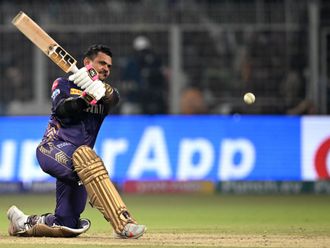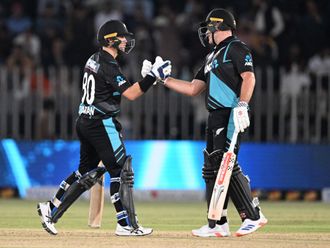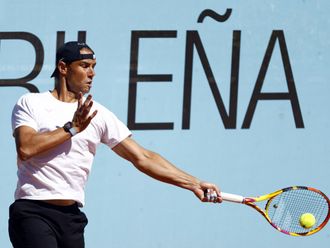Dubai: M…S…D…pronounce each letter with emphasis, triggering off the airwaves in your mouth, to understand that the trio of characters define the simple, but solid identity of an Indian cricketer, captain and role model, who is poised for eminence beyond the parameters of sport, if he chooses.
His name is Mahendra Singh Dhoni. He is India’s most successful cricket captain by a mile and then some.
here are two ways to treat Dhoni’s tryst with destiny, as if he isn’t famous already, or this narrative with transcendence: fall hard for it, or find the proposition blatantly absurd. Either way there is a story waiting to be told well after he vacates the stage of professional sport to become a big, bold headline in a mission of his preference.
Today, Indian cricket fans are seeing a version of Dhoni 2.0. Gone is the dashing, carefree, devastating batting style. The delightful abandon with which he once used to bat, an approach that paid huge dividends for him and India, as sixes and boundaries rained on the stands and lit up the scoreboards, has been replaced with the aura of a chess player who works out the permutations and combinations of his team’s chances between victory and defeat before finding a solution and applying it. The experts have coined a phrase for this Yoda-esque attitude, they call him ‘The Finisher’.
The long trendy locks have been discarded for a conservative cut which is in symmetry with the contours of his weather-beaten face, where the growing age-lines demonstrate the miles he has covered, both literally and figuratively, over the passage of his career.
Paying the price
The hair and long sideburns, once black and radiant with the sheen of youth, now have streaks of grey. Dhoni doesn’t dye his locks. Nothing wrong with showing a bit of maturity. It is the price one must pay for captaining a team of 11 cricketers and a population of a billion plus Indians. It is representative of the hard yards he has covered while leading his country in 60 Tests, 178 one-dayers and 49 T20Is with extraordinary success.
It is easy to gauge Dhoni’s reaction on something as simple as an effective stumping, or a caught behind decision which he has effected as the team’s wicketkeeper. There is a childlike euphoria to it: he springs in the air, with his arms circling over his head, and then runs towards the bowler for validation. It is, however, tough to sense how he feels after a victory, or a defeat: is he happy, sad, depressed, or fulfilled? The face masks an impenetrable bubble of privacy, which is could be translated as having a cynical view of proceedings but, is rather a smart, practical defence mechanism which he adopts to keep things real.
Through the ambiguity, however, is all manner of indication that the Indian cricket captain is poised to become a transformative figure. An individual who has the ability to transcend cricket and leave a mark on humanity if he wishes. Dhoni’s life, as it were, has all the ingredients to influence an impending glorious twist to the final storyline.
Is there another version of Dhoni waiting to spring up on our collective consciousness? A version 3.0?
Perhaps. It could be the storyline of a script which is refreshingly innovative. Not the boring drama centred around the comeback of a cricketer who has been discarded. Or the story of an ageing batsman who has rediscovered his form and is playing like a man possessed before the curtain call.
No. These scenarios have a short shelf life. Sport is littered with such tales. They simply humanise those who are famous. Someone like Dhoni deserves more.
This is what Ravi Shastri, Director of the Indian cricket team till the World Cup and me both felt during a discussion on the Indian captain, while gazing intently into our respective drinks, diluted by cubes of ice to facilitate sensible conversation, as if they were crystal balls that could conjure images of Dhoni’s future.
Impressed
Shastri, an astute student of the game and cricketers, has had the benefit of sharing valuable space with Dhoni. The effect the Indian captain has had on him – as a cricketer and human being - has been fascinating. Shastri is one who does not get impressed easily.
“Dhoni symbolises every good quality that is the face of modern India,” said Shastri in an intense tone, while blowing rings of smoke towards an already overcast ceiling of the outlet we sat in.
The smog in the room was being enveloped and reprocessed by the sultry notes being repeatedly struck to perfection by Lina, a Cuban singer, whose voice transported the audience back and forth between Havana and Dubai.
“More importantly,” asserted Shastri, breaking Lina’s spell, “To every budding cricketer who plays within his limitations, and makes pressure and adversity his best friend, Dhoni symbolises hope,” asserted Shastri.
“Take a look at his career graph,” he enthused. “The teams and superstars he has managed with incredible success - you will learn an important fact: in a team sport the sum is always greater than the parts. This is Dhoni’s mantra and the reason behind his success.”
Shastri then traced with admiration the methodology of an unflappable, confident captain who, after achieving everything beyond his brief, still managed to take a team of youngsters — when no one gave India a chance — through an unbeaten streak into the semi final of the World Cup where they eventually lost. Dhoni and his boys were not disgraced in defeat. Those who could not fathom the true import of India’s achievement, crying out in anger and exasperation, were the ones who discredited themselves.
Winning against odds
“I can tell you one thing with confidence,” offered Shastri, “As a cricketer, captain, role model, or whatever role he chooses to pursue, if it is Dhoni then it is possible. Winning is the final chapter in sport. Winning against the odds assumes more importance. Dhoni has not only won accolades for India in every format, but he used this World Cup, with a brand new unit, to pitch skills against the opposition when no one gave him a chance. This is the team for the future and Dhoni knows it. If he wants to lead the side till 2019 then they could blossom into world champions.
“If we assess Dhoni’s past, where he has come from and compare it to where he stands in the history of world cricket today the impact that he can leave will be astounding.”
Perhaps the only significant contribution made by the district of Ranchi, Dhoni’s hometown, one of 24 districts that makes up the eastern Indian state of Jharkhand, has been the celebrated and notorious Central Institute of Psychiatry.
The British established this organisation in 1918, naming it the Ranchi European Lunatic Asylum. It was the premier centre for mental health in the country. If you were mad you were promptly shipped off to Ranchi, or so the verdict would affirm.
Today, the entire country (and Ranchi) is mental about Dhoni. The young man who was a ticket collector in the Railways, cricketer, captain, role model and finally the highest earning cricketer in the world with an annual income of $30 million (Dh110 million) and a net worth of $100 million (according to Forbes) has come a long way. More importantly, Dhoni is respected as a man who has not compromised on his principles or his dignity.
“The best part about him,” said Shastri, “Is that he wears the mantle of fame lightly. I firmly believe the world hasn’t seen the best of Dhoni yet and I don’t just mean in the sphere of cricket. He is a true leader. Those who believe in his abilities will understand and follow. You only need to tick off the boxes on what he has achieved to gauge his true impact.
“A man’s worth is judged by the legacy he leaves behind. This is true for ordinary and extraordinary individuals. On the basis of this fact when MSD hangs up his bat and calls it a day from cricket, whenever that may be, I can tell you with conviction that he will climb the peaks in whatever field he then chooses to become a very great man...
“…And you heard it here first,” Shastri said in his usual, confident, matter-of-fact way, while gesturing to the waitress for a few more cubes of ice.
Perhaps, all we can do is wait and watch.












